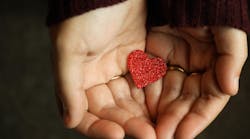Sometimes as I’m driving down the road, bopping to my music and feeling happy, I look down and see my hands on the steering wheel, and I feel a sudden jolt to my brain. That jolt is the result of a split-second dialogue that my brain is having with itself, and that dialogue goes something like this:
“Whose hands are on my steering wheel?!”
“Yours.”
“Impossible! These are old hands!”
“You are old.”
“No, I’m not. I don’t feel old.”
“You’re 68. That’s old.”
“Oh. Yes, you’re right. I am old.”
My hands are 68 years old, and it follows that the rest of me is as well. And while I enjoy good health and don’t feel old, my hands like to remind me that feelings don’t always align with reality. My hands look like they’re 68. They have age spots. One knuckle is enlarged due to an infection many years ago. The other knuckles are starting to show signs of osteoarthritis. My wedding band no longer fits. My skin is dry and the veins are more prominent and there are wrinkles.
More by Kirsten Brancheau:
Musings of an older hygienist
Boris is ready to see you, but are you ready to see him?
I am a little self-conscious about my hands, especially at work. After all, I’m a hygienist. My hands are essential to what I do. Sometimes, as I write something down for a patient on a piece of paper and they look over my shoulder, I wonder, “Are they looking at my hands? Are they questioning my ability to do my job? Are they wondering if maybe next time they should schedule with the younger hygienist?” It’s even worse if they compliment the ring I’m wearing. “Ack! They’re looking at my hands! They know I’m a fraud-hygienist!” (Yes, along with being a little neurotic and overly dramatic, I have a touch of impostor syndrome.)
Aside from the appearance of my hands, I notice other changes. My fingers have a little more difficulty with opening and closing tiny clasps on jewelry. It’s harder to open containers that require me to squeeze and turn at the same time. I can no longer play the flute or mandolin because the finger that got infected years ago no longer bends all the way.
In spite of all this, I am still able to perform my job effectively and without pain. In fact, I think that I’ve gotten better at what I do in the past 10 years. It’s always nice to hear compliments from patients after I complete a prophy, and it seems that I receive more compliments the older I get. Maybe it’s because I’ve had a long time to perfect my technique. But I think it may be something more.
About 10 years ago I saw an acupuncturist for a few months (not for my hands). Something he said has stuck with me over the years. He told me that as he treats patients, he notices his hands get very warm and red, and he attributed that to the healing energy passing from his hands to the patient.
I never saw this happen, since I was always in a prone position and didn’t really want to see all those little needles anyway, but I liked the idea of healing energy flowing from his hands to my body. I thought about my own hands. Did my hands get warm and red while treating patients? Well, yes, they do get warm, and sometimes they get downright sweaty, but I think that’s from the gloves. I can’t tell if they get red because I’m wearing gloves, but they’re not red when I remove the gloves unless they’re really chapped. I don’t think sweaty hands and chapped skin were what my acupuncturist was referring to.
But I took the concept of healing energy flowing from my hands to the patient, especially when I had a patient with inflamed tissue and sensitivity. I imagined healing going from my hands into their tissues, and if this actually did something physically for the patient or if it simply made me more mindful and possibly more gentle, I don’t know, but I found that as I thought about healing the patient, the patient seemed to relax more.
I try to look at my hands a bit more sympathetically now. They’ve been through a lot. All those years of scaling and root planing and retracting, not to mention all those dishes washed, rocks climbed, instruments played, tubs scrubbed, toilets cleaned…well, these hands have earned the right to look a little beat-up.
And while I notice there are things I can’t do anymore, I’m grateful for the things I still can do. Instead of my flute or mandolin, I can play the autoharp. While it may take a little longer, I can still put my jewelry on and take it off. And unfortunately, I can still do the dishes, scrub the tub, and clean the toilet.
I expect that someday my hands will say to me, “Enough already! Give us a rest and retire, will you?! Can’t you see we’re old?” But for now, they still know how to scale and root plane and retract without complaint, and I think they enjoy what they’re doing. And they allow me to continue doing what I love, so from now on I will try to overlook their flaws and simply be grateful for these old hands.
Editor's note: Originally posted in 2021







